About MasterChef Generations
MasterChef Generations is the last aired season of MasterChef. A reality TV competition for amateur cooks, led by the world-renowned Chef, Gordon Ramsay. MasterChef Generations aired on May 29th and had its final episodes aired on September 18, 2024. MasterChef Generations was a new theme of the popular cooking competitions where Millennials, Baby Boomers, Gen Z and Gen X faced off to prove that age does not matter in the kitchen. The winner of the season is Michael Leonard who was in the millennial's team.
Michael Leonard and Christopher Murton about MasterChef Generations
The two stars of MasterChef Generations; Michael and Murt
If you are a fan of the popular cooking competition you are probably already familiar with the faces of Murt and Michael. Even if you are not a fan of the competition you might have seen them sharing recipes on social media and amazing their audience with their culinary skills.
Michael and Murt are both 28-year-old cooks and chefs who took part in the latest MasterChef season. The biggest controversy of the season was why they were placed in different generations while being the same age.
We sat down with these two charismatic and charming young chefs and talked about all the controversies, challenges during the show, the reality of judging contestants' cooking skills, as well as future plans.
If you are planning to apply for the next MasterChef season listen to what Michael and Murt have to say, get a little bit of courage and go win the show.
How did you keep the results of the show a secret for such a long time?
Murt: That’s a good question. Michael won the show, so congrats to him again. He cooked some incredible dishes during the finale, and it was awesome to watch. For me, the experience was a little different. Everyone leaves the show in a different mindset.
For me, I was just having fun the whole time, being a jokester, not taking things too seriously. I left the show with a smile, just happy to have been there as long as I was. But it does hit you emotionally, especially when you realize you're not there anymore.
Murt
Watching it live, though, hit me harder. Seeing yourself leave after all the episodes have aired makes you reflect on what you could’ve done differently. It felt more emotional seeing it on TV than living it on set. When you're on the show, you have everyone around to support you, but watching at home, it's just you and maybe a few friends. They don’t fully understand what you went through.
My close friends knew I didn’t make it to the finale. They guessed it because I’d invited them to earlier episodes. So, when those last couple of episodes before the finale aired, they were like, “You’re going home tonight, right?” And I was like, “Yeah, I am.” But seeing yourself leave the show after going through the whole experience — that hit harder.
Michael: It was a mix of emotions, similar to what Murt said. Winning was cool, but seeing yourself on TV at first — it’s strange, almost jarring. Like Murt, I started hyper-fixating on my mistakes and everything I said. There were a few episodes where I cringed a bit, knowing I’d be in every episode
I was nervous about how they’d portray me, but in the end, I was happy with how it turned out. I had a watch party with friends, and it felt good to see the support I was getting afterward. It’s always a bit nerve-wracking wondering how people will perceive you, but overall, the response has been great.
Michael
The next day, though, it hit me. Going on Instagram and seeing all the comments and posts was overwhelming. I spent hours just responding to messages. It was cool, but I wasn’t expecting that level of attention right away.
How to deal with hate and love comments on social media?
Murt: I’ve gotten plenty of hate comments. Honestly, it’s kind of entertaining to read what people say, especially on Reddit threads. For the nice comments, I always thank people after the show. That’s why I made a Reddit thread where I shared my story and answered whatever questions I could without breaking my NDA. I think that engagement with fans really means a lot to them.
I had a watch party and made a whole menu for the event. There were people there I didn’t even know, and while I wasn’t the one cooking, I had already shown the cooks how to prepare everything. The fans really appreciated that engagement, and I think that’s what makes the experience memorable for them.
As for the hate comments, I just think they’re peanut butter and jealous. They wish they were in our position. The harshest critics are always behind a keyboard — they’d never say it to your face. So, I don’t take it seriously. They’re just jealous they’re not on a show, cooking for Gordon Ramsay and the other judges.
Murt
Michael: I don’t really go on Reddit much or read what people say about me. Maybe I should, but I feel like dealing with negative comments would be tough. Honestly, I’ve been lucky and haven’t received many negative comments. But I know other contestants have been bashed, and I felt bad for them.
A lot of people make assumptions and say negative things just for the sake of it. Murt’s attitude about it is great, though — just being confident and brushing it off because, like he said, they’re just keyboard warriors. They’re coming at you for no reason, probably because they envy what you’ve accomplished.
Michael
Negativity comes with being in the spotlight but staying positive and not letting it get to you is key.
Murt: Yeah, for both me and Michael, we mentally prepared ourselves for this. We knew we were going on one of the biggest cooking shows in the world, and with that comes both positive and negative attention. We knew what we were getting into, so we were ready for it. It’s just something you expect when you’re in this position.
How to prepare for competing on MasterChef?
Michael: I think there are two types of preparation — mental and literal. The moment I got the call for the audition, I started practicing every single day, cooking nonstop. I even rewatched all the seasons of MasterChef.
On the mental side, you can’t help but prepare because you have months leading up to the competition. You’re sitting there, thinking about it constantly, running through worst-case scenarios, wondering how you’ll perform. By the time you actually get there, you’ve thought through so many possibilities that you’re ready for anything.
Michael
Murt: Yeah, I agree. I’m an optimistic person but also a realist. I was realistic about my chances. I thought, "Maybe I’ll get out there and not even get an apron." I prepared myself for that. But then I ended up making it to the semi-finals, which was way beyond what I expected.
We all prepared in different ways, though.
Like Michael, I cooked every day before the competition. One of the big things I did was build up an arsenal of dishes I could rely on. We all have these go-to dishes, and we just adjust them based on the challenges. Being good chefs, we understand ingredients and recipes enough to know what works and what clashes.
Murt
So, a lot of it is being able to put dishes together on the fly, and that comes from the practice and preparation we’ve done over time.
What are your tips for applying to MasterChef?
Michael: Funny enough, I didn’t get on the season I originally applied for.
I applied for the previous season, didn’t hear anything back, and then a year later they called to ask if I was still interested.
Michael
They asked a bunch of questions, which at the time, I didn’t understand. They asked stuff like, “What do you think about all the different generations?” I had no idea what that was about, but I just applied online and got a call a year later.
Murt: Michael, what made you apply for the show? What was your "now’s the time" moment?
Michael: Well, I used to watch the show all the time, and I knew I could cook. I always said if I got on the show, I’d do really well — like top five.
One day, my friend told me to put my money where my mouth was and apply. So, I did.
Michael
I have this mix of confidence and anxiety. I was so anxious all the time during the show, especially waiting around for the challenges. The waiting was the hardest part, but once you start cooking, you just zone in.
Murt: Yeah, I remember during auditions, you were always on your phone. I don’t know who you were talking to, but you were outside, just focused. You were so zoned in on winning.
Everyone approaches the competition differently. Some people are just having fun, while others, like Michael, are dead set on the prize. It’s all about what works for you. To add to that, I think it’s important to understand that we’re not your average home cooks. We’re a few steps ahead, able to create incredible dishes out of almost nothing. That sets us apart from regular home cooks.
Murt
I started making cooking videos on Snapchat during COVID, showing recipes and stuff, and people kept telling me to apply for MasterChef. I was intimidated by the crazy dishes they show on the show. But, after a few drinks and some peer pressure, I applied for season 13, just like Michael. I went through the interviews, but they told me I wasn’t a fit for that season.
Looking back, I think they had planned to save us for season 14, which had a generations theme. So, I got the call, just like Michael, and we both went to Los Angeles to compete. That’s my story.
Let’s talk about the MasterChef Generations concept. Why were you placed in different generations?
Murt: That’s a great question.
It’s funny because Michael and I are the same age, but we were placed in different generations. I think it comes down to how we act. Michael fits more into the millennial category—he’s more mature. I, on the other hand, fit into Gen Z. I’m totally happy with how they categorized us.
Murt
At the end of the day, it’s an individual competition. Yeah, you have your generation, but you’re really just looking out for yourself.
Even in team challenges, you’re still focused on your own performance because eventually, it’s every person for themselves.
Michael: Yeah, I agree. That’s a crucial mindset. If you get too wrapped up in the whole team aspect, you could lose yourself because you’re relying on that protection.
But by the time we got to the top 12, we switched to individual competition, and it was every person for themselves.
Murt: Yeah, it was around the top 12 that we switched from teams to individual challenges, like during the tag team challenge.
Michael: Exactly.
Keeping that individual mindset really sets you apart as the competition progresses.
Michael
Let’s talk about the next season theme – Couples. What do you think about the concept?
Michael: I actually really like that concept.
Murt: Yeah, I’m kind of interested in it too. I was talking to the production about it, trying to figure out how it’s going to work. Like, are there going to be 40 chefs, 20 teams of 40 people? It’ll be interesting to see how they structure it. I can’t really disclose much more, though. I know a little background info, but I must keep quiet on that. Yeah, can’t break any NDAs here.
Adnana: Exactly! But I’ve seen a lot of people online discussing it, with some excited and others a bit skeptical. What’s your take on that?
Michael: I think the psychology behind it is really interesting.
Some of the most memorable episodes are the tag team challenges, the team challenges, or the wall challenge, because they create so much drama. Now, if you have two people working together throughout the entire competition, you’re going to see a lot more of that. There’s bound to be disputes, and the challenges they can come up with are going to be fascinating.
Michael
I think it’s a great idea. In fact, I had mentioned a couple of seasons ago that they should do a duo or couples season, so it’s funny they’re finally doing it. We’ll see how it turns out, but I don’t think I’ve ever seen a bad season of MasterChef.
Murt: Yeah, it’ll be very interesting.
Personally, the tag team challenges were my least favorite. I dreaded them — they were brutal! So, the thought of an entire season built around teams is giving me nightmares.
Murt
But I agree, it’s going to make for some really good TV. I’m excited to see how it plays out.
What was the most unexpected thing in MasterChef Generations?
Murt: I didn't expect there to be that many cameras and lights. There were probably 50 cameras everywhere, and I can't even count how many lights were on the ceiling.
The production for the show is insane — it was like, blinding. I wasn’t prepared for that.
Michael: Yeah, that's true. The lights were tough.
Something that really surprised me was how skilled some of the home cooks were. It's crazy to see everyday people who are just so good at cooking.
Michael
I also didn't expect how much waiting we’d have to do. There were times when we were just standing around for an hour, and we had no idea why.
Production-wise, it makes sense, but we often felt in the dark about what was happening. It’s something I always tell people — it’s not just the challenges; a lot of the time, we’re kept guessing about everything until it happens.
Michael
Murt: The competition is mentally exhausting, not just physically.
You never know what's coming next, so you're constantly on edge, waiting and wondering. It's a huge mental game, and you just have to keep going.
Murt
We had long days on set — hours and hours. You’ve got to just ride the waves and stay focused.
If it wasn’t Michael, who deserved to win?
Michael: That's a tough question.
Murt: I think we’re thinking of the same person.
Michael: Yeah, I was going to say Adam, probably.
Murt: I don’t know, I thought Anna had it, man. If she hadn’t messed up that dish, she would've had it in the bag. She was an incredible cook, no offense. Just insane.
Michael: Yeah, I agree 100%. I didn’t forget about Anna, but she got out early, and it shocked everyone.
Hands down, she was probably the most talented cook there. Her dishes, plating, techniques — it was all insane. She made me really nervous, especially since we were in the same group.
She got eliminated during the cake challenge, which probably gave me a better shot. But yeah, it was a huge moment.
When she got eliminated, it felt real — like, okay, they’re not messing around with judging here. If you’re not cooking a great dish, you're going home.
Michael
Murt: Every time someone got sent home, it was for something like undercooked chicken or a salty sauce. When it was my time, I knew halfway through my dish that I was going home.
What is more important, personality or cooking skills?
Murt: Personality helps, especially to get on the show.
If someone cooks a dish as good or bad as you, they’ll probably pick the person with a great personality. But it's not everything — it won't carry you through the whole competition. If you can't cook, you'll get weeded out pretty quickly.
Murt
Michael: Legally, they have to keep the competition fair — it’s all about cooking.
The judges are being real and grading every dish to the smallest detail. It is all about your skills and performance.
Michael
But personality goes a long way in terms of screen time. A bigger personality will probably get more screen time, but it doesn't necessarily mean you'll make it further in the competition. You still have to cook.
Exactly. It is drama TV, with a splash of cooking.
Murt
What comes after MasterChef?
Michael: That’s a tough question because it’s not really one big thing, but a series of things.
I’m going to keep focusing on social media, but I also want to get into private catering and dining to stay active in cooking. Eventually, I want to work in Michelin-starred restaurants to really learn different techniques and refine my skills. Down the line, I do want to open a restaurant, but I know I’m not ready for that yet. I still need more experience and time before I can take that step.
Michael
All this kind of ties together — traveling, social media, cooking — there are a lot of ideas I want to explore. I’ve been sticking with the same format for a while, but I have new ideas in the works. Now that my business is slowing down a bit, I think I can start focusing on those projects.
Murt: Yeah, I’m in the same boat as Michael. We’re still really young, and there’s so much more to learn — especially when it comes to techniques.
Private dinners would be cool, and I actually have one planned in about a month with someone from MasterChef Junior, so that should be fun. I’m also thinking about staging at a few restaurants in Florida to see how they operate and to learn from them.
Murt
Social media is another big thing, but what people don’t realize is that being on the show leaves us in a kind of limbo. We’ve been waiting to see ourselves on TV, and for the last year, we’ve just been on pins and needles, trying to figure out what direction our careers are going to take based on the show’s impact. So right now, we’re navigating that space and trying to plan our next steps.
Who is a good mentor and what characteristics do they have?
Michael: When it comes to a mentor, the first thing you should look for is results — something tangible that shows they’ve succeeded themselves.
If they haven’t achieved their own success, how are they going to guide you? So, their personal achievements are key.
Michael
Beyond that, it's about how well they can teach. It's tricky because the mentor who works perfectly for one person might not be a good fit for someone else. That’s because people have different teaching and learning styles.
Some people don’t mind being yelled at to get motivated, while others completely shut down when that happens. For me, I think a mix of both styles works best — some aggressive, “let’s go” energy combined with hands-on teaching.
In general, I’ve found that to be effective across different situations.
Murt: Yeah, I agree. Patience is also a big factor when it comes to being a good mentor.
Everyone learns differently. Some people learn best from reading a book, others by doing hands-on work, and some just by watching demonstrations. It all depends on the person’s learning style, so the mentor needs to match that.
Murt
Like Michael said, sometimes a little yelling works, but for others, it doesn't. Some people thrive under pressure, while others crumble.
And again, the mentor’s success in their own career is crucial. They need to be credible in order to mentor you.
Michael really nailed it there — I don’t have much to add.
What is the best career advice you got?
Murt: I remember watching this thing on Chef’s Table on Netflix and they were really inspirational.
There’s this one episode about Grant Achatz and his restaurants, and I remember him saying something along the lines of “Mistakes are how you learn.”
He talked about how he made so many mistakes while creating dishes, but each one taught him something that helped him perfect those dishes.
Mistakes are fine, but the key is to learn from them. Don’t keep making the same mistake over and over — that’s really stuck with me.
Michael: Hmm, that’s a tough one. I've gotten a lot of career advice, but I think this ties back to the mentor conversation.
It really depends on who the advice is coming from. Obviously, meeting Gordon Ramsay was huge for me — he’s been my idol. I’ve talked about this in other interviews, but one of the main things he emphasized was confidence. He’s always talking about being a confident chef, and that stuck with me.
It’s probably the biggest piece of advice I’ve taken to heart — just be confident in what you’re doing. It doesn’t matter if you fail, like Murt was saying; you’ll learn from it.
But at the same time, it’s important not to be arrogant, because that’s when you start losing yourself.
What is one thing you wish you knew before applying for MasterChef?
Michael: Probably how long everything takes.
It’s very time-consuming — there’s a lot of traveling, interviews, paperwork. It's stressful.
When you first apply, you kind of expect it, but once it starts happening, it's like, "Am I going to be able to do all this?"
Murt: Yeah, I’d say a couple of things.
One thing I wish I knew is how important sides are. I was always focused on the main protein or sauce, but the sides can make or break a dish.
I wish I had more sides prepared, ones with acid, spice, or greens that complement a dish.
And mentally, you need to be really strong and prepared for what you’re going to go through.
MasterChef Generations: Everything you need to know
MasterChef Generations has been one of the most interesting MasterChef seasons so far according to the internet. Laugh. Michael Leonard and Christopher Murton have talked about everything you need to know as a fan or a future contestant.
If you are hungry for more MasterChef interviews, check out our interviews with Claudia Sandoval, Luca Manfè, Tom Aviv and Carmen Miranda.
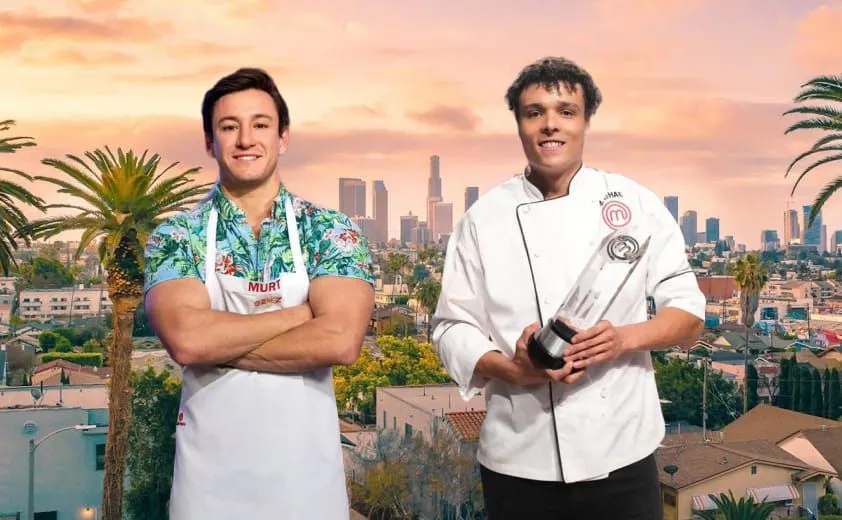

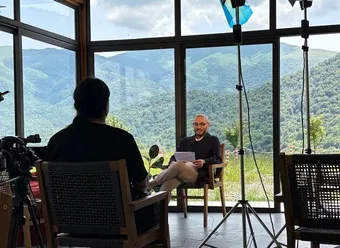
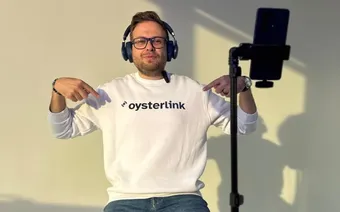
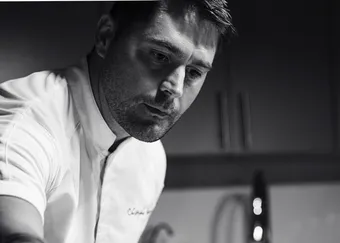
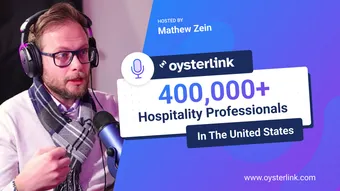
Loading comments...